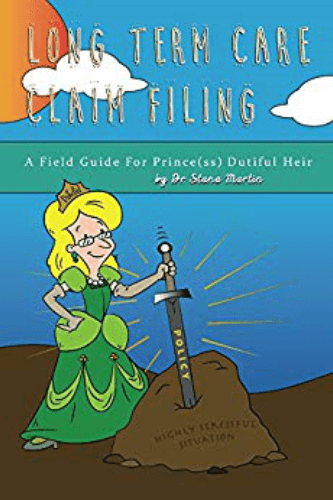Look here for the Top 10 CLAIMS Insider tips from Mrs. LTC. You will not want to miss out on this information.
#1 CHANGE THE ADDRESS ON RECORD:
One of the first things we recommend family do is to change the address on record with the carrier. Change it to the address of the person who is managing this process. Make no mistake, SOMEONE has to manage it! You don’t want any important documents still being mailed to an address where mail is checked intermittently, not at all, or by someone who may discard the notice to the trash.
Simply call the carrier with the policy holder present and request the address change. Or send a written notification with the policy holder’s signature and/or the Durable Power of Attorney’s signature (be sure to include a copy of the DPOA)
#2 Have Third Party Release on File w/Carrier:
Carriers are bound by the HIPAA law and have very little “wiggle room.” They cannot share information about a policy or claim with anyone other than the policy holder or their designated representative. You can be “designated” in a Power of Attorney document (which you have to provide to the insurance company) or thru a Third Party Authorization (TPA). The TPA has to be signed by either the policy holder or their Power of Attorney to be legitimate.
#3 Call to Confirm Benefits:
There can be many “hidden” items in long term care contracts. The policy may have had some inflation growth since it was bought, for instance. Or the policy owner may have requested a reduction in benefits somewhere along the line. So it is always smart to call the carrier and confirm what the current benefits are. Further, it is hard to know if the person you spoke with is seasoned and well trained. So, if in doubt, call back and speak to a second person. If you get the same information both times, chances are you know you are getting right information.
#4 Call on Weds, Thurs or Friday:
Monday and Tuesdays are always the busiest days for phone calls to insurance carriers. If you call on one of those days, you are much more likely to have a long wait on hold. Calling later in the week can save you time and frustration listening to all that groovy hold music!
#5 CALL BACK TO CONFIRM RECEIPT:
If there is one thing we have learned over the years of doing this it is that you HAVE to call back and confirm that documents you have mailed or faxed in have arrived safely and got into the correct file. Every company out there hires humans — who are prone to the occasional error. When you add to that the way technology sometimes fails us, it is not surprising that you cannot assume that things have arrived just because you sent them. Time and again a call to confirm receipt will head off the worst problems of lost pages or faxes.
#6 Precision Match:
Humans have a tendency to think “close is good.” But contract law is very precise and unforgiving. If the contract says you have to need help with 2 of 6 Activities of Daily Living (ADLS), then every document that goes to the insurance company should show help with 2 of 6…and the same two! If someone (say a doc) fills out a form with only 1 and someone else (say the assisted living) sends in 2 and someone else (say the claimant himself) says none…the claim will deny out. So BEFORE things go to the insurance company, be sure they match each other and the contract.
#7 FILE HOSPITAL AND REHAB DAYS:
Some contracts will allow days that Medicare paid to count towards the elimination period or even be benefit eligible. The contract will tell you if this is so — it will indicate whether or not there is coordination of benefits with Medicare. If there IS coordination, chances are the Medicare-paid days won’t pay benefit…but they will count towards the elimination period. If you aren’t certain, file those days anyway. The worst that will happen is you will get a decline-to-pay notice for those dates of care…and the best that can happen is they will count as claim-eligible days. It is better by far to file and get a decline than to not file and miss out on benefits that the policy holder is eligible for.
#8 CALENDAR OR SERVICE DAY:
If the claimant is in a facility such as an Assisted Living Facility or a Nursing Home, this fine point won’t make any difference. But if the claimant is in Home Health Care, this can be a HUGE difference. The contract will specify if the elimination period (the deductible window where you pay 100% of the cost of care) is a calendar day or if you must have paid-for services on a day for it to count as an elimination period day. If you can’t discern from the contract, call the carrier and ask if the policy is a service day or calendar day elimination.
If it is SERVICE day, be sure that you are using services most days of the week to meet the deductible as quickly as possible.
#9 BACK FILING:
A very few policies will have a sunset date on your ability to file a claim. In other words, if you haven’t filed within a certain time window, the carrier won’t let you file. But MOST carriers will work with you to allow you to back up and reclaim care that happened months back. This can be especially helpful in meeting long elimination periods.
When in doubt, back up and file on care provided in the last year or two. Worst case scenario is you get a decline and you are no worse off than you were before. Best case scenario is that you will get some or all of those days approved. You will be that much closer to getting money from the policy.
#10 Don’t Forget To Breathe:
You are on an insurance JOURNEY…this is not a sprint, this is a good 10K run. Insurance companies are required to do due diligence to be sure they are paying legitimate claims. To you – the person trying to wrestle the claim – it feels like they keep asking for more and more and more documents! Understand this is normal. Claim filing is document intensive. You are doing the job that (in a regular doctor office) takes 1 to 5 staff to do! So take a deep breath, don’t blow a gasket with your own blood pressure. Lean into the process, keep hustling documents – keep calling the company and asking if there is anything still outstanding. Breathe. Eventually the claim adjuster will have all that they require to make a claim determination.
#11 ( A freebie…) APPEAL of a Denial:
They are possible and winnable. But you will need to know EXACTLY why the claim was denied and be able to produce new information or evidence that will address the reason for denial in order to win. For instance, say someone is declined claim because their dementia is not yet severe enough as evidenced by standardized cognitive tests. You will need her attending neurologist to write a letter explaining WHY the dementia is more severe than the cognitive tests show and recommending the level of care the policy holder needs. This might be enough to win an appeal… Or if you have been denied because there wasn’t evidence of 2 of 6 ADLS (see tip # 6 above) you can submit corrected documents…but only if you send the corrected document with a VALID REASON why it was incorrect in the first place. There are lots os possible scenarios and we haven’t room here for all of them. Appeals can be tricky, so if you are at all in doubt, set up a time to visit with a specialist if you would like to chat thru your particular case.
NEW OPTIONS FOR CLAIM HELP! DO-IT-YOURSELF PRODUCTS!
MRS.LTC is excited to introduce and new way to help in the claim process! While our staff can certainly help you craft an appeal, we charge $150 to do that with you. This DIY module allows you to do the same for half the cost.

Questions?
Contact - Mrs. LTC
Long Term Care Claims & Insurance
Question about a Claim?
Shopping for coverage?









Leave A Comment
You must be logged in to post a comment.